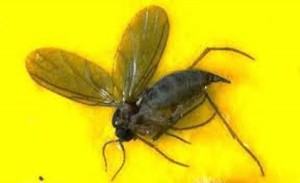Kitchen gnats can thrive in winter because of houseplants
Chronicle Media — February 12, 2016

The ideal environment for fungus gnats is wet soil with high organic content.
(Photo courtesy of University of Illinois Extension)
Fungus gnats are common pests of houseplants. They usually are a nuisance pest as adults, eating very little but laying many eggs in the soil of your favorite houseplants.
“The major houseplant migration, along with the bananas that are ripening on my counter have caused fungus gnat chaos in my kitchen,” said University of Illinois Horticulture Educator Kelly Allsup.
In addition to plants, compost collecting is another factor for attracting gnats. They spend most of their life as larvae, eating organic matter and young roots. Their ideal environment is wet soil with high organic content.
If you face a similar situation, first tighten up your watering. Let plants dry between watering and throw out any weak and dead plants. If plants are too wet, use a fan to dry out the soil surface. This may also deter the weak-flying adults.
Second, set out yellow sticky cards with adhesive, available on the Internet. The yellow coloring attracts flying insects. They can be purchased online and affixed to a Popsicle stick at the edge of the pots. To detect the larvae, place a small cut of potato on the soil surface for a day or two.
Third, add fall leaves to the compost pile in the backyard to reduce the wetness of the rainy fall.
Note, treatments need time to work. An adult female can lay hundreds of eggs in her short life. Three to four weeks are needed to drastically reduce a fungus gnat population.
Read and follow label directions of all organic pesticides.
If the problem persists, use beneficial bacteria called Bacillus thuringiensis that causes the larvae to stop eating. It can be used as a soil drench or dry powder. Be sure to water in dry powder.
Apply diatomaceous earth to the base of the plants. Diatomaceous earth is fossilized aquatic organisms that are not poisonous but cause insects to dry out and die. It remains effective as long as it is kept dry and undisturbed.
Re-pot the plant in high-quality soil, eliminating existing eggs and larvae.
Visit https://web.extension.illinois.edu/lmw/eb255/entry_6208/ for insect management practices for common houseplant insects.
For more information, contact Kelly Allsup, Extension horticulture unit educator, for the Livingston, McLean and Woodford unit at (309) 663-8306, or email Kelly at kallsup@illinois.edu
— Kitchen gnats can thrive in winter because of houseplants —



